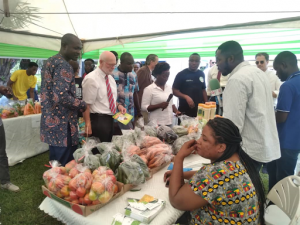Stories by Isaac AIDOO, in Accra, Ghana
MAJOR stakeholders in Ghana’s horticultural sector have called for increased partnerships to catalyse the country’s economic growth.
Jeroen Verheul, The Netherlands ambassador to Ghana, who formally opened the Fruits and Vegetables Fair hosted by the Ghana’s Department of Parks and Gardens from September 27 to 29, noted that the opening of the exhibition symbolized the growing partnership between The Netherlands and Ghana in the field of vegetable and fruit production.

The fair which was themed: ‘Harnessing the gains of the horticulture sector – with focus on the Africa Continental Free Trade Area,’ was under the aegis of Ghana Vegetables in partnership with the Horticulture Business Platform which is also under the Ghana Netherlands Business and Culture Council.
Verheul recalled that The Netherlands has been working with the Ghanaian horticultural farmers and entrepreneurs for many years and that it sees the sector as one of the most prominent drivers for economic growth in Ghana.
In his view, there are three main reasons to further strengthen the partnership in horticulture: economic growth, improved diets and employment possibilities.
Economic growth
The agricultural sector is important for the Ghanaian economy. Almost 20 percent of the country’s Gross Domestic Product (GDP) is linked to agriculture (GSS, 2022) and accounts for over 30 percent of export earnings (FAO, 2023). Both for the domestic and the export market, the horticultural value chain plays a significant role in the economy and the sector is growing on average at 10 percent. Compared to the average of 3.3 percent of the broader agricultural sector, the market opportunities in vegetable and fruit production are significant.
Currently, Ghana is mainly producing tomato, pepper, onions and okra but also many of these products are being imported from surrounding countries, mainly originating from Burkina Faso, Niger, Cameroon and Togo. Ghana only produces five percent of the onions it consumes locally and there are indications that the Kumasi and Accra markets alone already import $120 million worth of fresh and dry onions (RVO, 2021). In total, Ghana spends up to $3.4 billion in mainly processed agrifoods.
“The shifting security situation in the Sahel is occasionally putting pressure on some of those imports, as we have seen with haltering trade flows of Nigerien onions and Burkinabé tomatoes. This poses a challenge for Ghana as the average intake of fresh vegetables by Ghanaians is already relatively small compared to its regional neighbours,” the ambassador noted.
Improved diets
The Global Nutrition Report has indicated that consumption of vegetables in Ghana is only 46 percent of the recommended amount for healthy living. On average, a person should consume a minimum of 400 grams of fruits and vegetables per day (FAO/WHO). In Ghana not even the intake of 200 grams is currently being met. This is partially caused by the relatively high prices of vegetables and fruit. The Ghana Living Standards Survey indicated that 13 percent of total food expenditure is going to vegetables, mainly tomatoes (36%), onions (19%) and chilies (10%). One important way to tackle high food prices is to start producing more, and more efficiently. That is why the Netherlands is joining forces with initiatives all over Ghana that maximise horticultural production as well as to reduce the cost of production. Key areas of attention are the development of sustainable crop value chains, improving the access to markets and access to finance, the training of farmers on good agricultural practices and entrepreneurial skills and finally access to new and improved fruit and vegetable varieties. More production leads to growth of the sector, leading to a higher demand for agricultural services and growth of the value chain.
Increasing employment
Currently the agricultural sector is the biggest employer in Ghana. Roughly 36 percent of the 31 million Ghanaians are working in the sector (GSS 2019), amounting to 11 million people in total. Many of them are, however, considered to be active on a very small scale. Currently 77 percent of the 11 million are considered to be subsistence farmers (FAO). The governments of Ghana and The Netherlands share the perspective that this should be different. It is widely acknowledged that small and medium enterprises form the backbone of the economy. They lead to economic growth, industrialization and the creation of jobs. That is why The Netherlands is partnering with a large group of stakeholders, including the Ministry of Food and Agriculture, on supporting the Ghanaian food system, growing it into an environment where horticultural farmers and entrepreneurs can thrive.
The jobs created will lead to more income, more companies, more jobs, better quality and nutritious food, enabled through win-win partnerships. An example of that partnership can be seen at the opening of the Fruit and Vegetable Fair, organised for the seventh time, this time by the recently founded Horticultural Business Platform (HBP). This new organisation is a platform for farmers, cooperatives, governments, entrepreneurs, knowledge institutes, Ghanaian and Dutch private sector and development partners to come together. The platform will build bridges, facilitate partnerships and provide first-hand information on the needs of the sector.
Fruits, vegetable farmers must enhance trade across Africa
Solomon Gyan Ansah, director of crop services at Ghana’s Ministry of Food and Agriculture (MOFA), called on the players to “enhance intra-Africa commerce which will boost our economy and secure a substantial market share on the continent.”
He charged horticultural businesses, saying “we must get it right through collaborative efforts, increased business sector investment, and government policy direction. As a country, we must gain a deeper grasp of the dynamics of the expanding fruit and vegetable markets.”
Felix Mawuli Kamassah, president of Ghana Vegetables, said “a healthy workforce of a nation largely depends on the consumption of fruits and vegetables,” stressing the importance of Ghanaians consuming fruits and vegetables and the benefits therein.
He observed that Ghana vegetables and the various operators ‘commitment to promoting Fruits and Vegetables “has never been more evident than in the vibrant array of Fruits and Vegetables showcased here.”







